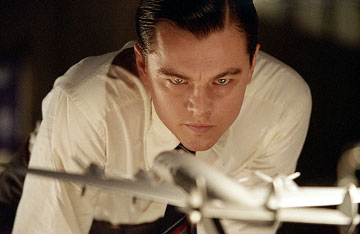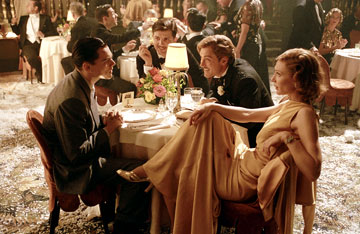

Eccentric genius Howard Hughes died 1976 of kidney failure at the age of 71. Over the course of his life, he directed movies, invented planes, dated movie stars, and did all sorts of bizarre things. He led a wildly colorful life, and The Aviator brings much of it into focus, yet by the time the credits roll, the Hughes character is still a mystery. The standout elements are the directing and the acting. Martin Scorcese (Gangs of New York, Bringing Out the Dead) brilliantly brings the early 1900s to life. It's easy to see what drew Scorcese to Hughes' story. Hughes was an iconoclast. He did whatever he wanted, and excelled in everything. When somebody told him he could not do something, Hughes took it as a challenge to accomplish it.
Technically, The Aviator is a great movie. Scorcese wonderfully captures the glamorous nature of early Hollywood, and Hughes' drive. The film takes place approximately over fifteen years, where Hughes was arguably at the peak of his creativity. Scorcese frames every scene nearly perfectly, capturing both the wonder and determination of Hughes. He frequently frames Leonardo DiCaprio in the center of the shot, either look directly into the camera, or filming from behind DiCaprio, showing both the isolation that Hughes felt and the larger-than-life sense he embodied.
Ever since Titanic, people seem to forget that DiCaprio (Catch Me If You Can, Gangs of New York) is a talented actor. His boyish good looks tend to help this part. Nevertheless, he is extremely good, and imbues Hughes with a manic sense of energy. For most of the film, his brow is furrowed in intense concentration, thinking of some newfangled idea. Eclipsing DiCaprio is Scorcese's impressive cast, including Cate Blanchett (The Return of the King, The Missing) doing a great impersonation of Katherine Hepburn, Alan Alda (What Women Want, The Object of My Affection) as a slimy Senator, John C. Reilly (Criminal, Anger Management) as Noah Dietrich, the man who juggled Hughes' books, and Alec Baldwin (The Last Shot, The Spongebob Squarepants Movie) as Hughes' competition, Juan Trippe, owner of Pan Am.
The closest Scorcese gets to explaining Hughes' eccentricities is a quick shot at the beginning where his mother drilled into him the dangers of the world. Hughes washed his hands until he bled. He hated all things dirty, and the sight of such things would cause him extreme distress. He was extremely picky about what kinds of food he ate (again because of cleanliness issues), paranoid, and would sometimes uncontrollably repeat things. At his worst (in the span of the film), Hughes locks himself up naked in an editing room, urinating into empty milk bottles. The Aviator begins as Hughes begins the torturous three-year production process for Hell's Angels, tracks him as he follows his two loves, the movies and aviation. He was intimately involved with the production of many of his planes, and would test pilot them himself. His dream of bigger and faster planes that could travel cross-country led him to buy TWA, and later come into the cross hairs of Trippe and the Senate. Money was never an issue. Hughes had a lot, but his dreams sometimes were too expensive. Still, he would tell Dietrich to figure something out. After all, genius should have no limitations. Scorcese ably portrays all the biographical information, but fails to go any deeper. So while the film looks great and the acting is great, there is an empty feeling that remains after the film ends.